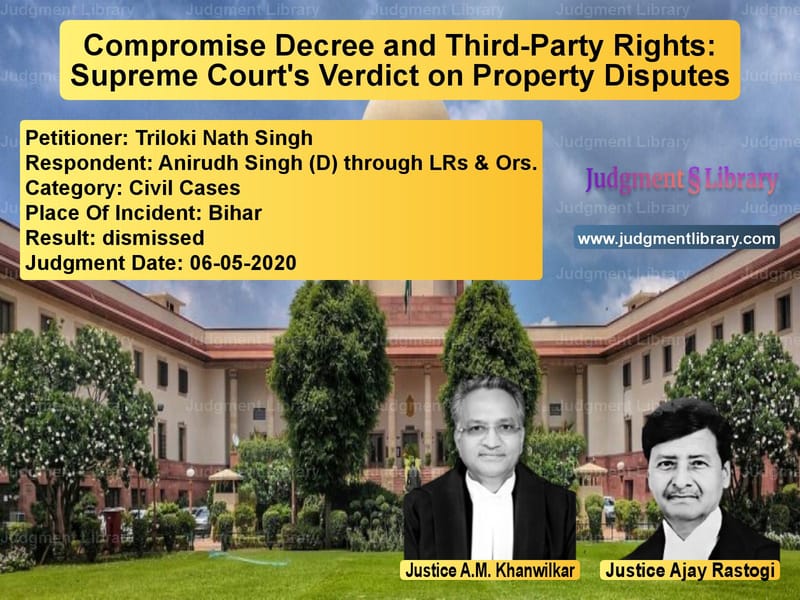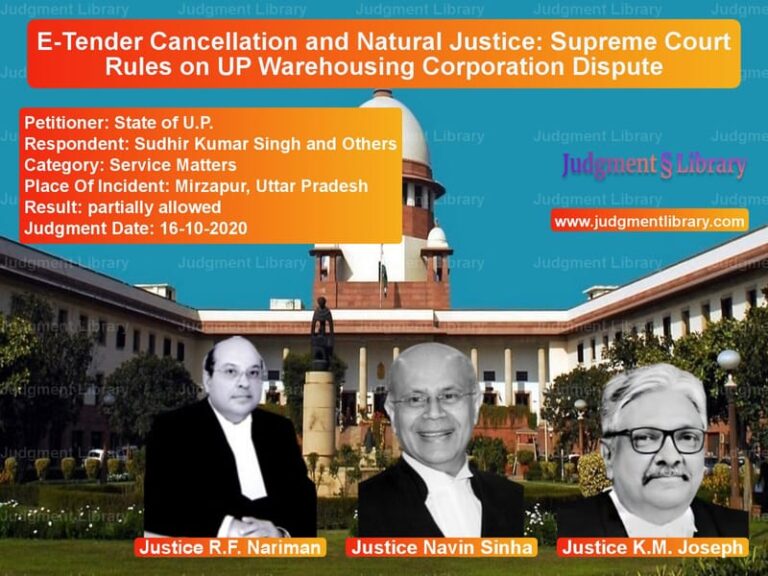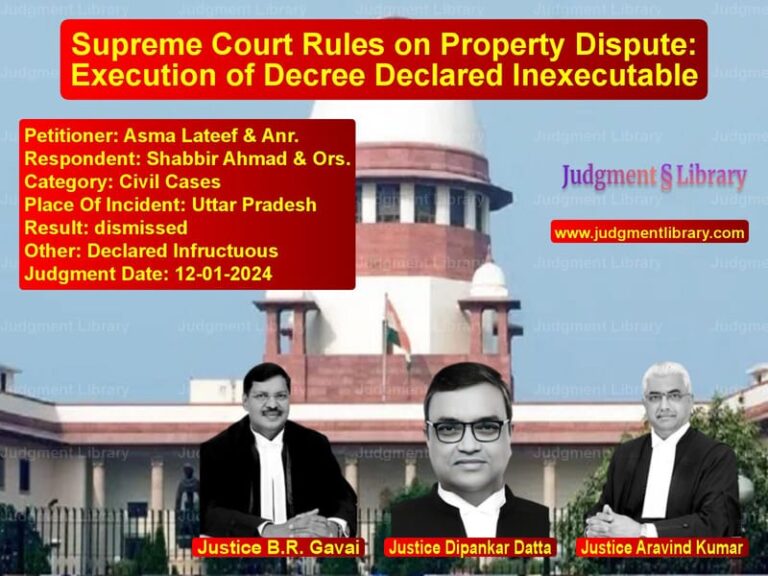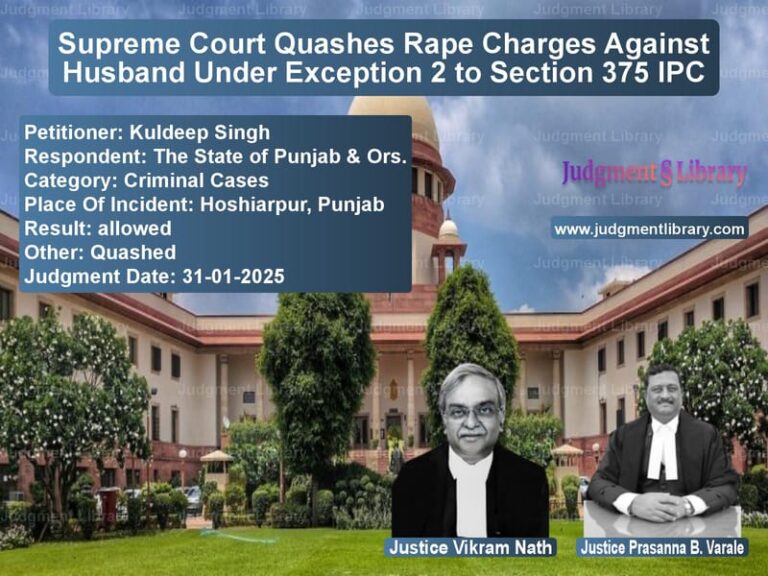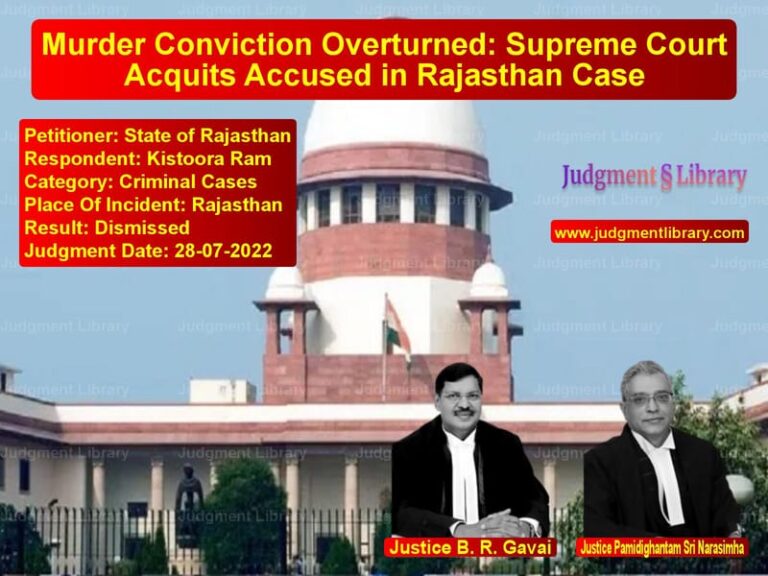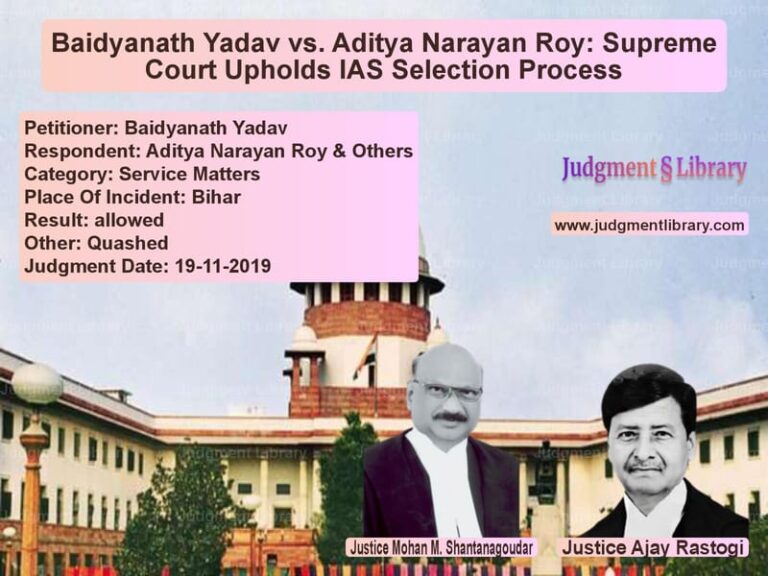Compromise Decree and Third-Party Rights: Supreme Court’s Verdict on Property Disputes
The Supreme Court’s judgment in Triloki Nath Singh vs. Anirudh Singh (D) through LRs & Ors. is a landmark case that clarifies the legal standing of third parties in challenging compromise decrees. This case addressed whether a person who was not a party to the original suit can file a separate suit to challenge a compromise decree obtained through alleged fraud and misrepresentation.
The ruling has far-reaching implications for property disputes and civil litigation, as it upholds the principle of finality in compromise decrees while defining the limited legal remedies available to third parties affected by such decrees.
Background of the Case
The case originated from a dispute over ancestral property belonging to Lakhan Singh, who had three sons: Din Dayal Singh, Jalim Singh, and Kunjan Singh. The property was inherited and subsequently became the subject of legal contention.
The appellant, Triloki Nath Singh, purchased a portion of the disputed property from Sampatiya Devi, who claimed ownership based on a gift deed executed by Kunjan Singh. However, another individual, Salehari Devi, claiming to be the daughter of Kunjan Singh, filed a partition suit seeking her rightful share in the property. The trial court ruled against her, but she pursued legal remedies through appeals.
Eventually, in Second Appeal No. 495/86 before the Patna High Court, a compromise decree was passed on September 15, 1994, recognizing Salehari Devi’s claim to the property. This decree altered the legal standing of multiple parties, including the appellant, who claimed a vested interest in the property through a prior sale deed.
Legal Issues Considered
- Can a compromise decree be challenged in a separate suit by a third party who was not a participant in the original suit?
- Does Order 23 Rule 3A of the Civil Procedure Code (CPC) prohibit such independent suits?
- What legal remedies are available to third parties who claim to be adversely affected by a compromise decree?
- Does a prior sale deed executed before a compromise decree hold legal superiority over the decree itself?
Arguments of the Petitioner (Triloki Nath Singh)
- The appellant contended that the compromise decree was fraudulent and obtained through misrepresentation without disclosing his pre-existing rights over the property.
- He argued that since the sale deed in his favor was executed before the compromise decree, his legal rights should take precedence.
- The appellant claimed that the High Court was misled into passing the decree without considering the fact that he had already purchased the property.
- Since he was not a party to the original suit, he had no other remedy available except to file a fresh suit.
Arguments of the Respondents
- The respondents argued that a compromise decree can only be challenged before the same court that passed it, not through a separate suit.
- They relied on Order 23 Rule 3A CPC, which expressly bars separate suits challenging compromise decrees.
- The respondents asserted that the appellant’s claim derived from Sampatiya Devi, who was a party to the compromise, and therefore he could not claim independent relief.
- They maintained that the compromise decree was valid and binding, having been passed with the consent of the parties involved.
Supreme Court’s Analysis
The Supreme Court examined the relevant provisions of the Civil Procedure Code and legal precedents to determine whether the appellant had any legal grounds to challenge the compromise decree in a separate suit.
Finality of Compromise Decrees
The Court emphasized that Order 23 Rule 3A CPC was introduced to prevent endless litigation over compromise decrees. The provision states:
“No suit shall lie to set aside a decree on the ground that the compromise on which the decree is based was not lawful.”
The Court observed that the legislature’s intent behind this provision was to ensure the finality of compromise decrees and avoid multiplicity of litigation.
Precedents Supporting Finality
The Court referred to previous rulings, including Pushpa Devi Bhagat vs. Rajinder Singh, which held:
“No independent suit can be filed for setting aside a compromise decree on the ground that the compromise was not lawful.”
Similarly, in R. Rajanna vs. S.R. Venkataswamy, the Supreme Court reinforced that a compromise decree must be challenged before the same court that issued it.
Application to the Present Case
- The Court noted that the appellant’s rights, if any, were derived from Sampatiya Devi, who was a party to the compromise decree.
- Since the compromise decree was validly passed by the Patna High Court, the appellant could not challenge it through a separate suit in a lower court.
- The only legal remedy available to the appellant was to file an appropriate application before the Patna High Court seeking relief.
Key Findings
- The appellant’s suit was barred under Order 23 Rule 3A CPC.
- Since the appellant’s claim was based on a sale deed executed by Sampatiya Devi, who consented to the compromise, he could not independently challenge the decree.
- The proper course of action for the appellant was to approach the High Court that issued the decree, not to file a fresh suit.
Final Judgment
The Supreme Court dismissed the appeal, upholding the High Court’s ruling that a compromise decree cannot be challenged through a separate suit, even by a third party.
The judgment reinforces the principle that compromise decrees, once passed, are final and binding, ensuring judicial efficiency and preventing unnecessary litigation.
Implications of the Judgment
- This ruling sets a strong precedent against collateral attacks on compromise decrees, ensuring that parties respect judicial settlements.
- Third parties claiming to be affected by a compromise decree must seek relief before the same court that issued it.
- The decision highlights the importance of due diligence in property transactions, emphasizing that buyers should verify any ongoing litigation before purchasing property.
- By upholding the finality of compromise decrees, the ruling reduces the risk of prolonged legal disputes, promoting certainty in civil litigation.
Conclusion
The Supreme Court’s judgment in this case serves as a critical legal precedent in property and civil dispute resolution. It underscores the importance of finality in compromise decrees and limits the scope of third-party challenges.
For individuals engaged in property transactions, this ruling highlights the necessity of thoroughly investigating the legal history of a property before purchase. It also reaffirms that courts prioritize stability and finality in judicial decisions to prevent unnecessary litigation.
Ultimately, this judgment strengthens the legal framework governing compromise decrees and provides clarity on the available legal remedies for third parties affected by such decrees.
Petitioner Name: Triloki Nath Singh.Respondent Name: Anirudh Singh (D) through LRs & Ors..Judgment By: Justice A.M. Khanwilkar, Justice Ajay Rastogi.Place Of Incident: Bihar.Judgment Date: 06-05-2020.
Don’t miss out on the full details! Download the complete judgment in PDF format below and gain valuable insights instantly!
Download Judgment: Triloki Nath Singh vs Anirudh Singh (D) th Supreme Court of India Judgment Dated 06-05-2020.pdf
Direct Downlaod Judgment: Direct downlaod this Judgment
See all petitions in Contract Disputes
See all petitions in Property Disputes
See all petitions in Specific Performance
See all petitions in Judgment by A M Khanwilkar
See all petitions in Judgment by Ajay Rastogi
See all petitions in dismissed
See all petitions in supreme court of India judgments May 2020
See all petitions in 2020 judgments
See all posts in Civil Cases Category
See all allowed petitions in Civil Cases Category
See all Dismissed petitions in Civil Cases Category
See all partially allowed petitions in Civil Cases Category

